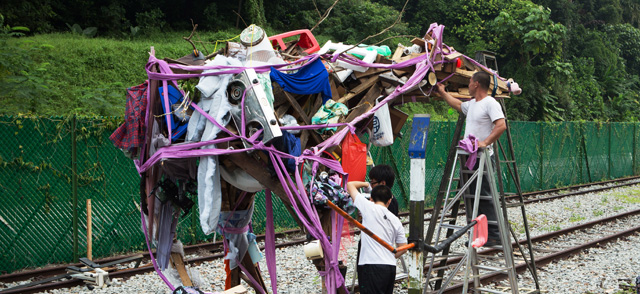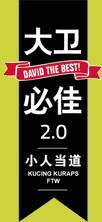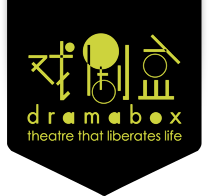
Kok Heng Leun's
"Aesthetic of the Poorer Cousin"
— A Discourse on Community Theatre
Written by Kate, Wang Fang
Photography by Tan Ngiap Heng
"Theatre does not target only the upper class. If theatre needs to convey a message, then our target audience should be the masses at the lowest end. I have always believed that it is time people can easily access theatre. In other words, every time I want to watch a play, I can do so without having to pay a lot of money, or even without paying a cent. Community theatre discusses issues that are easy to understand, but that does not mean that its presentation or artistic value is at the lowest-end. We cannot underrate the general public's ability to appreciate the arts."
– Extracted from "Interview with Kok Heng Leun — Newspaper/Community Theatre", from the book "Drama Box: 1992-2002" (Singapore: Drama Box, World Scientific Publishing Co Pte Ltd, 2004), Page 283.
I started to settle "old scores" with Heng Leun as soon as I met him, by reading him the abovementioned paragraph. And I asked: After ten years, what are the changes in Drama Box's community theatre? Drama Box has been doing community theatre for ten years, but it seldom talks about its aesthetic and its methodology. In this interview, which coincides with Drama Box's upcoming community theatre Project Mending Sky: Us, we invited the Artistic Director of Drama Box — Kok Heng Leun — to share with us the ten years of community work that Drama Box has been through.
Community Theatre vs. Community Engagement: We May Even Need to Change its Name

Heng Leun began by analysing the now-familiar term of "Community Theatre".
"Actually Drama Box is currently giving a lot of thought to the term 'Community Theatre'. Firstly, once you form a community, you simultaneously create a barrier which excludes all other communities. So when we talk about community theatre, we may need to talk about the manner in which it actually operates. The word that we have recently been using is 'engagement'… We have not thought of an equivalent translation in Mandarin, so let's leave it to intelligent people like you to do so!"
What?
I am really not that skillful, so let us for the time being define it as "community interaction"(社群互动). But in order to retain its full meaning, I shall continue to use the word "engagement".
Heng Leun went on to explain, "Engagement can be separated into two aspects: to 'call', and to 'respond'. That is to say, in the process of engagement, there is a receiver, and there is us (the community theatre). For example, when an issue surfaces in the community, the people are in fact calling out that they wish to discuss about it, we as the theatre group will respond. This is one kind of engagement. The other type would be when we recognise an issue that no one else has, we call out, and the community responds."
"Engagement is interactive in nature. Nobody dictates the direction of the issues, and nobody dominates the space for the right to discuss. We can also put it this way: engagement is not a marriage, we are not trying to "marry" the audience, and no one needs to be responsible for anyone else. We are two different families, with two different possibilities. When we are done with our work in one community, we will go on to the next. And because of that, the community can choose to retain its original characteristics, but also has the option to open up its predetermined boundary to search for changes."
"Actually, if we wish to use community theatre to change the community, it would be problematic in principle. We don't want to just keep protecting the identity of the community either. What we need is an engagement so that the community can either choose to retain its characteristic, or to question its characteristic, or to change over time. 'Call and respond' is a very crucial process of interaction. Through theatre, the community can make changes to its identity, or it may bear a few identities, or one that is constantly flowing and evolving."
In its early days, Drama Box's community theatre usually took place in the neighbourhoods. Performances usually explore specific social issues, and were presented through theatre forms such as Forum Theatre, Legislative Theatre, "mockumentary theatre", etc. Does Drama Box's change in its ideology of community theatre mean that the audience has to change as well?
Heng Leun answered this from the ticketing point of view. "If we look at it through the angle of engagement, the idea of the duality of the audience (those who can pay, and those who cannot) that I used to talk about becomes irrelevant. Once the audiences pay, it becomes a form of operation in a market system, it becomes a business transaction. Can this transaction take up another form of vocabulary? Can it be a kind of involvement instead, and not just a price? As an audience, I provide a kind of 'capital', instead of just paying for a performance. Engagement has to be accomplished by both parties together."
"In the future, audience may still need to pay for our community theatre, but the act of paying will not simply be a market transaction… we have not found the definitive way, but we would want the audience to feel that they too can make contributions to the performance, whether creatively or financially, since more often than not, our ideas come from the community, and we simply use our professional knowledge to transform it into a production."
Community vs. Theatre: The Aesthetic of the Poorer Cousin

Why do we need to do community theatre? What is the difference between watching a piece of community theatre and a play in a big hall? To Heng Leun, the aesthetic of the community theatre needs to be refined and sublimated. In many parts of the world, community theatre is still being treated as the 'poorer cousin'.
Taking the upcoming Project Mending Sky: Us as an example, he said, "We have been looking at different methods of creation in the past few years. This year's Project Mending Sky is very different: we are working in a place that is very historical, with a lot of memories, but also with a lot of lost memories. We are narrating a piece of Singapore history and trying to engage Singaporeans with the environment they live in. In the past, we used to tell the audience how important it is to conserve the environment. I think we are now slowly moving into another phase: besides sharing with the audience, we would also want them to respond. There will be more interactions."
"In the past when we performed at a particular community, that community is just a performing space. That was relatively simpler — the performing site is a theatrical space and a place for the public to gather. Now we go to Bukit Timah Railway Station, which is definitely a more complex space: within it holds the history of Singapore's beginning, and the historical relationship between Malaya and Singapore; at the same time, it becomes a performance space, and when we put in an issue, it becomes a public space. That space then demonstrates different dynamics and flexibility, so it becomes a lot more layered."
"The audiences do not need to understand everything because they would have already experienced it through the process. When the space changes, the audiences' thought processes and encounters become more diversified. This kind of engagement would not be possible in a theatre hall; this sort of aesthetic experience will also slowly develop its means of embodiment."
The Answer vs. The Organic Capibility: The Stimulation of Creativity

As we spoke about Drama Box's future developments, Heng Leun revealed that he is currently striving to take up an exciting project: the "Prism Project" by the Institute of Policy Studies. This project aims to discuss the future political climate of Singapore with Singaporeans, and the kind of policies that Singaporeans need. Heng Leun pointed out that if we are able to take up this project, then we can do a very in-depth engagement.
"Here we are talking about something very fundamental: what kind of Government do Singaporeans need? We will use a variety of forms such as film, installation, theatre, social media, etc... From 10 in the morning till 10 at night, hopefully we can attract ten thousand people by then."
"Our theatre has indeed such function, but this function needs to have a basis — that is, the theatre should not simply be a theatre of information. It should have a set of aesthetics, and it must offer an experience for creativity. When you are looking to engage a community, you do not seek for an answer in art, but instead you build a kind of organic capability. The most fundamental aspects of organic capability, to me, are creativity and imagination. It is the demonstration of imagination and creativity, not just the solutions to problems. Speaking from another point of view, it is good that social issues emerge, because they inspire and arouse our creativity and imagination."
"I hope that the community space we work in is not just a space for issues. If the theatre that is set up becomes a space with issues, with memories, and also with identities, then to me the important question now would be how to stimulate imagination and creativity. In this process, the imagination and creativity that are evoked also need to be able to stimulate the community, so that the community can go to the next level with their organic capabilities. Our theatre needs to be able to evoke such organic capabilities."
As we continually think about the relationship between the society and ourselves, maybe the theatre is, just like us, searching for its functionality too. When we get involved in the theatre, perhaps both parties are simply embarking on a common journey.
Towards the end of the interview, I asked Heng Leun, "What is the relationship between the social activist and an artist?"
"The artist can be a social activist, and the social activist can be an artist."
"Are you an artist or a social activist?"
"I am a practitioner."

|
Kok Heng Leun is the artistic director of Drama Box. He is also one of the few effectively bilingual theatre practitioners in Singapore and has an extensive experience in theatre, having directed close to 60 English and Mandarin productions, with numerous awards to his name. Under his helm, Drama Box has become known for its exciting theatrical works that are staged at major theatre venues and community housing estates. These works often address social issues that are relevant to Singapore society. |

Win a pair of David The Best 2.0 Kucing Kuraps FTW tickets worth S$58 each!
Share a personal story on the power of the little, on Drama Box's Facebook page now. Story that garners the most "Like" will win a pair of David The Best 2.0 Kucing Kuraps FTW tickets worth S$58 each!
- Submission deadline: All stories to be submitted before 30th September 2012.
- In case of dispute regarding contest winner and prize, the decision of Drama Box shall be final.
*Note: David The Best 2.0 Kucing Kuraps FTW is performed in Mandarin without English surtitles!

